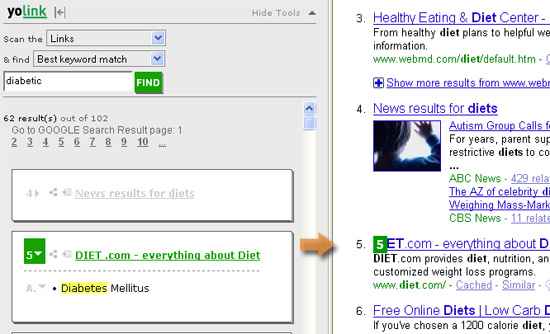Yolink offers a suite of new products aimed to make search easier and more productive, starting with an API for integrating yolink into any web service. Yolink can be used to enhance existing search engine results, or can provide site or app search functionality outright…….
TigerLogic also unveiled easy-to-implement yolink blog and site search widgets for non-programmers, as well as yolink Labs, a group of proof-of-concept environments that demonstrate the power of the technology on popular sites and services.
Yolink technology enhances search and offers a smarter way to cut though the layers of unfiltered, extraneous information to find exactly the information you are looking for,” said Brian Cheek, Director of Business Development. “What we’ve done is provide a way for people to step through links and inside documents to get the information they really need, quickly. This is something the search market and web site developers have been waiting a long time for.
Yolink technology cuts down the time to research and find key information on the web, in PDFs, ebooks and more. Too often a web search is just the beginning of a real search – for an apartment, for an excerpt, for an old classmate, for a product review. Yolink excels when there are multiple-step or multiple-query searches by taking unwieldy results and surfacing key information so users can quickly find information and focus on getting things done.
Yolink’s power is demonstrated in the Labs project section on yolink’s website, where any user can experience firsthand how yolink can enhance search results on popular sites and services. Some of the yolink Labs projects include yolink for Craigslist, Google Patent Search, Wikipedia and Yahoo Boss search, among others.
Yolink is generally available via its API and blogger and site search widgets. TigerLogic also offers a browser plug-in and desktop search application for those who want to use yolink across the web or an individual computer.
Quick Pitch: Yolink is a next-generation technology that enhances search by extracting information from behind links and inside of documents.
Genius Idea: Yolink wants to be a researcher’s best friend. How? By searching not just a page, but also the links contained within that page. This makes finding contextually linked information super simple.
Yolink is available as a browser plugin (for Firefox, Internet Explorer and Google Chrome), a desktop search app or a widget you can integrate with your own blog. The service is also an add-on to Craigslist, Wikipedia and Google Patent Search.
The Yolink team has also created a yolink Labs project that showcases just how powerful the service really is. From the Labs projects, you can interact with Yolink in any browser.
Yolink would be useful enough if it only searched behind links and showed you relevant data from within those links, but it takes it to the next level with its share and save options. You can save the data to a Google Doc for instance, or save each link as a bookmark. You can also take data and send it to people via e-mail, capture it with Evernote or save something directly to EasyBib, with the citation automatically formatted correctly and linked.
Yolink has also opened up its developer API so that it can be integrated with just about any site on the web. Yolink is like semantic search on steroids and with the right type of integration, this service could really start to turn heads.As it stands right now, Yolink is one of the best ways to canvas through lots of dense text or to deep dive into heavily-linked sources.
Resources :mashable.com,marketwatch.com






